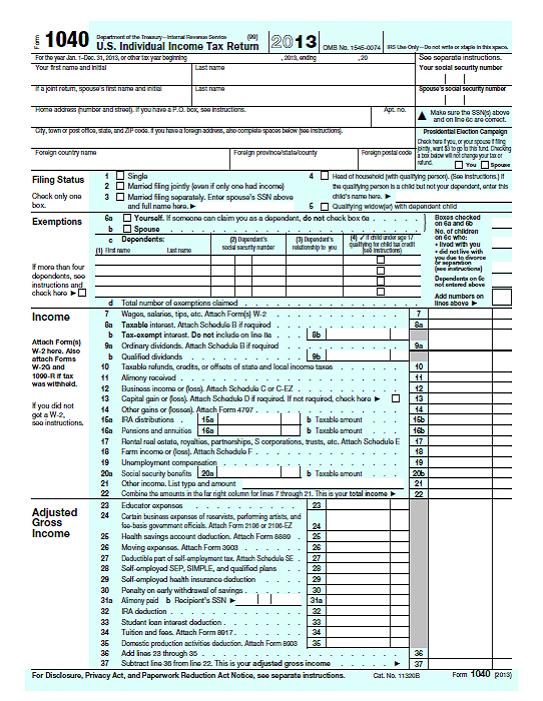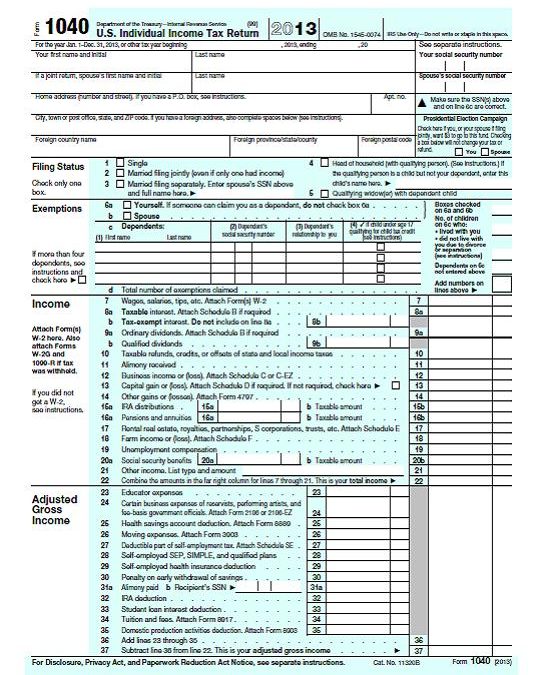 So, you neglected to file a 2013 federal income tax return because . . . well, who knows why. If that’s you, check out this announcement from the IRS:
So, you neglected to file a 2013 federal income tax return because . . . well, who knows why. If that’s you, check out this announcement from the IRS:
WASHINGTON — The Internal Revenue Service announced that unclaimed federal income tax refunds totaling more than $1 billion may be waiting for an estimated 1 million taxpayers who did not file a 2013 federal income tax return.
To collect the money, taxpayers must file a 2013 tax return with the IRS no later than this year’s tax deadline, Tuesday, April 18.
“We’re trying to connect a million people with their share of 1 billion dollars in unclaimed refunds for the 2013 tax year,” said IRS Commissioner John Koskinen. “People across the nation haven’t filed tax returns to claim these refunds, and their window of opportunity is closing soon. Students and many others may not realize they’re due a tax refund. Remember, there’s no penalty for filing a late return if you’re due a refund.”
The IRS estimates the midpoint for potential refunds for 2013 to be $763; half of the refunds are more than $763 and half are less.
In cases where a tax return was not filed, the law provides most taxpayers with a three-year window of opportunity for claiming a refund. If they do not file a return within three years, the money becomes the property of the U.S. Treasury. For 2013 tax returns, the window closes April 18, 2017. The law requires taxpayers to properly address mail and postmark the tax return by that date.
The IRS reminds taxpayers seeking a 2013 refund that their checks may be held if they have not filed tax returns for 2014 and 2015. In addition, the refund will be applied to any amounts still owed to the IRS, or a state tax agency, and may be used to offset unpaid child support or past due federal debts, such as student loans.
By failing to file a tax return, people stand to lose more than just their refund of taxes withheld or paid during 2013. Many low-and-moderate income workers may have been eligible for the Earned Income Tax Credit (EITC). For 2013, the credit was worth as much as $6,044. The EITC helps individuals and families whose incomes are below certain thresholds. The thresholds for 2013 were:
- $46,227 ($51,567 if married filing jointly) for those with three or more qualifying children;
- $43,038 ($48,378 if married filing jointly) for people with two qualifying children;
- $37,870 ($43,210 if married filing jointly) for those with one qualifying child, and;
- $14,340 ($19,680 if married filing jointly) for people without qualifying children.
Current and prior year tax forms (such as the Tax Year 2013 Form 1040, 1040A and 1040EZ) and instructions are available on the IRS.gov Forms and Publications page or by calling toll-free: 800- TAX-FORM (800-829-3676). Taxpayers who are missing Forms W-2, 1098, 1099 or 5498 for the years 2013, 2014 or 2015 should request copies from their employer, bank or other payer.
Taxpayers who are unable to get missing forms from their employer or other payer should go to IRS.gov and use the “Get Transcript Online” tool to obtain a Wage and Income transcript. Taxpayers can also file Form 4506-T to request a transcript of their 2013 income. A Wage and Income transcript shows data from information returns we receive such as Forms W-2, 1099, 1098 and Form 5498, IRA Contribution Information. Taxpayers can use the information on the transcript to file their tax return.
State-by-state estimates of individuals who may be due 2013 tax refunds:
| State or District | Estimated
Number of Individuals |
Median
Potential Refund |
Total
Potential Refunds* |
| Alabama | 18,100 | $729 | $17,549,000 |
| Alaska | 4,700 | $917 | $5,665,000 |
| Arizona | 24,800 | $650 | $22,642,000 |
| Arkansas | 9,900 | $722 | $9,571,000 |
| California | 97,200 | $696 | $93,406,000 |
| Colorado | 20,200 | $699 | $19,454,000 |
| Connecticut | 11,500 | $846 | $12,691,000 |
| Delaware | 4,300 | $776 | $4,321,000 |
| District of Columbia | 3,200 | $762 | $3,341,000 |
| Florida | 66,900 | $776 | $67,758,000 |
| Georgia | 34,400 | $671 | $32,082,000 |
| Hawaii | 6,500 | $793 | $6,876,000 |
| Idaho | 4,500 | $619 | $3,919,000 |
| Illinois | 40,000 | $834 | $42,673,000 |
| Indiana | 21,700 | $788 | $22,060,000 |
| Iowa | 10,200 | $808 | $10,193,000 |
| Kansas | 11,100 | $746 | $10,700,000 |
| Kentucky | 12,900 | $772 | $12,627,000 |
| Louisiana | 20,300 | $767 | $21,209,000 |
| Maine | 4,000 | $715 | $3,645,000 |
| Maryland | 22,200 | $770 | $23,080,000 |
| Massachusetts | 23,000 | $838 | $24,950,000 |
| Michigan | 33,600 | $763 | $33,998,000 |
| Minnesota | 15,600 | $691 | $14,544,000 |
| Mississippi | 10,400 | $702 | $10,041,000 |
| Missouri | 22,400 | $705 | $20,787,000 |
| Montana | 3,600 | $727 | $3,480,000 |
| Nebraska | 5,300 | $745 | $5,084,000 |
| Nevada | 12,300 | $753 | $12,078,000 |
| New Hampshire | 4,400 | $892 | $4,930,000 |
| New Jersey | 29,900 | $873 | $33,207,000 |
| New Mexico | 8,100 | $753 | $8,162,000 |
| New York | 54,700 | $847 | $59,416,000 |
| North Carolina | 29,800 | $656 | $26,874,000 |
| North Dakota | 2,900 | $888 | $3,209,000 |
| Ohio | 36,000 | $749 | $34,547,000 |
| Oklahoma | 17,700 | $773 | $17,979,000 |
| Oregon | 15,500 | $658 | $14,188,000 |
| Pennsylvania | 39,400 | $835 | $41,078,000 |
| Rhode Island | 2,900 | $796 | $2,906,000 |
| South Carolina | 12,100 | $674 | $11,267,000 |
| South Dakota | 2,700 | $823 | $2,709,000 |
| Tennessee | 19,500 | $743 | $18,829,000 |
| Texas | 104,700 | $829 | $115,580,000 |
| Utah | 7,900 | $667 | $7,443,000 |
| Vermont | 2,000 | $747 | $1,859,000 |
| Virginia | 29,000 | $752 | $29,578,000 |
| Washington | 27,600 | $829 | $30,330,000 |
| West Virginia | 5,000 | $855 | $5,258,000 |
| Wisconsin | 12,700 | $675 | $11,619,000 |
| Wyoming | 2,800 | $911 | $3,189,000 |
| Totals | 1,042,100 | $763 | $1,054,581,000 |

